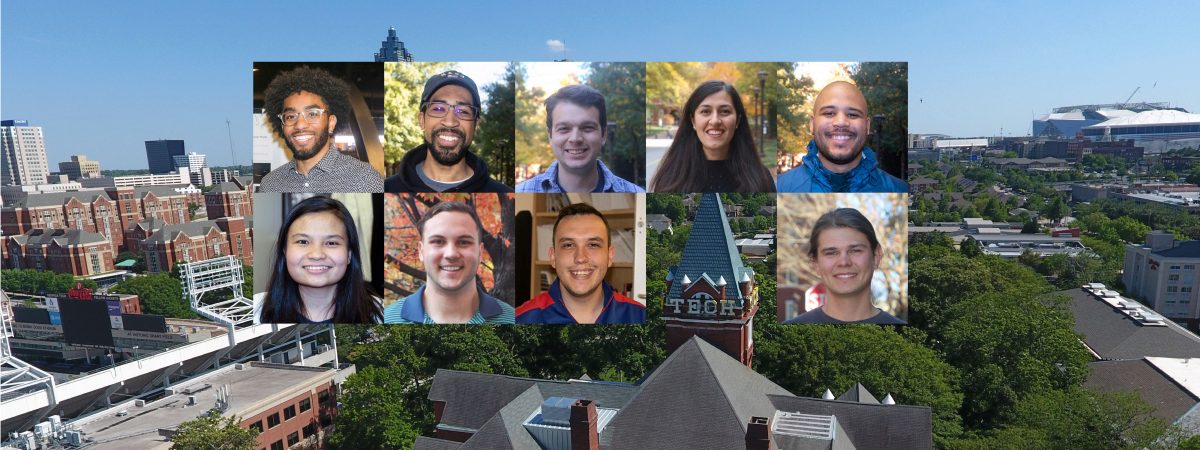
In their own words...
On December 13 and 14, when undergraduates, master's, and doctoral students celebrate their graduation from the Daniel Guggenheim School of Aerospace Engineering, they will each be on to a different adventure. An internship to round out their skills? A military assignment? Graduate school? A new career? Sleep? Each semester, we speak briefly with a handful of these graduates to find out what they'll be doing with that degree in hand.
Arega Margousian, BSAE '19
What is your next adventure?
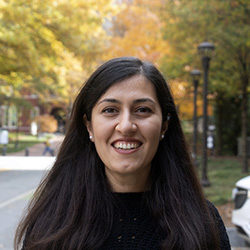 |
| Arega Margousian, BSAE '19 |
I just accepted a position as a propulsion testing engineer at the Busek Company in Natick, Massachusetts. They do research and development in electric propulsion and I will be on their micro propulsion team. I plan to work for a couple of years and then start a graduate program to continue learning.
What about your next adventure are you most looking forward to?
This job is very much aligned with what I want to do in graduate school - electric propulsion - and they know that that's what I plan to do.
Did you have any previous co-op, internship, or research experience in this area?
I have been working with Prof. Walker in the High Power Electric Propulsion Lab since 2017. There, I've learned to set up and run the vacuum testing facilities. With that sort of experience, I was able to get the internship in the Naval Research Lab, where I interned last summer, working as an electric propulsion engineer on hollow cathodes - a part of the Hall Effect Thrusters.
In the summer of 2018, I did an internship at Quartus in San Diego, doing structural analysis. I learned a lot.
How did your educational experience at Georgia Tech help you to achieve your goals?
The AE School helped me in a number of ways. First, there's the professors, who are very knowledgeable and great mentors. Then there are the classes where, you might not see it at the time, but the homework really prepares you for what you will face in the workplace. The problems I had to solve on my internships were like the problems I had already seen on homework, because the homework forces you to understand the concept, not just the answer that's in the book. Then there's the research experience. As a part of Dr. Walker's lab, I had access to all of the equipment and facilities that any research could want to solve problems. And Dr. Walker let us run the experiments, but he was always around if we had questions. I was mentally prepared to do research at the Naval Research Lab because it was so similar to what I'd experienced here. I was exposed to the equipment, the facilities, the challenge. And that's what makes Tech so different from other schools: if you do research here, you really learn how it's done.
Finally, I'd have to say the people I met at the High Power Electric Propulsion Lab were, intellectually, very smart, very focused individuals. I made great friends there, and learned from everyone. And it extended out of the lab, too. If I had questions about a class or about my career, those were the people I'd turn to.
What advice would you give to an underclassman who would like to follow the same path?
There are a number of things I'd say. First, take advantage of the faculty office hours, ask questions, before you make big decisions about your education or research plans. Second, I would say, form study groups. Even before that, you should make a point of talking to the person who is sitting next to you in class. Find out what they know, and help them with what you know. Outside of academic advice, I'd say: get outside your comfort zone. Try something new just to see what it's like. I participated in the Astronomy Club - not as much as I wanted to, because I wanted to do research, but I did go on a trip with them to Deer Lick Astronomy Village, which is a certified dark spot. Certified dark spots are where astronomists like to go to look at the stars. I also joined the Outdoor Recreation club because I am a hiker. But what I did with them was to go caving. It was quite an adventure, and I'm glad I did it because now I know that I don't really want to go caving again.
[Laughs.]
Looking back, I'd say the most important thing you can do is be honest with yourself -- and with your mentors -- regarding your skills, your interests, and your career. Don't keep it to yourself if you feel insecure. Ask, so that you can find a way. I was honest with myself about wanting to work in electric propulsion for space, but I didn't know how to make that happen, so I went to a lot of different people to ask them how to make it happen. The people I spoke to were smart, and they knew what I needed to do to get ahead. Not knowing was not the problem. Not asking would have been.
Honesty is always going to be important. I learned this again and again at Tech. For instance, once, I completely forgot to do the homework. Just didn't remember to do it. So I went directly to the professor and told him I didn't have any excuses or defenses. I had just not done the homework. I'm not saying that you should test this out by not doing your work, but the professor was so impressed with my honesty that he gave me an opportunity to make it up. Being truthful with yourself and with your professors is always going to be the right thing to do.
Julian D. Brew, PhDAE '19
What is your next adventure?
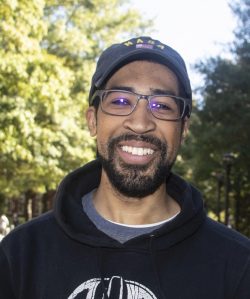 |
| Julian D. Brew, Ph.D. AE '19 |
I am moving to the Washington, DC area to work at Johns Hopkins Applied Physics Lab as a senior professional staff. I'll be focusing on space debris - detecting it, figuring out how to remove it and how to prevent collisions with active and non-active objects
What about your next adventure are you most looking forward to?
Secretly? [smiles] I'm looking forward to getting a real paycheck. I'll be able to afford real seafood, not the Atlanta version. [laughs] Seriously, though, I don't want to make it sound like it's all about money, but it certainly helps to see that all of my efforts as a grad student and a researcher are going to be compensated. I realize that, getting the Hope Scholarship as an undergrad and the NASA Space Technology Research Fellowship [NSTRF] in grad school, I'm one of the fortunate few who will graduate without debt. And I'm grateful for that. Now that I'm leaving grad school, I'll have a different lifestyle, though, and that's exciting. There are a ton of aerospace types in the D.C area, and I'm excited about joining that community and experiencing a different culture. And I'm really excited about joining this particular lab, because they do some really impactful work. If you Google Johns Hopkins Applied Physics Lab, you'll see they have worked on many NASA missions and have collaborated on a lot of really important research. I definitely won't be bored there.
Did you have any previous co-op, internship, or research experience in this area?
In graduate school, as a NSTRF fellow, I had to do a NASA internship every summer. The beautiful part was, I got to choose which [NASA] center I went to based on what I wanted to pursue. So my first summer I went to NASA Ames in California and did a good amount of planning for my Ph.D. work. It was the most research-y summer I ever had; I spent it all developing the math and theory that would inform my [doctoral] thesis. And the great part of an NSTRF is that they give you a NASA advisor who listens to what you want to do and then connects you with people who can help you get there. So, I had a great advisor at Tech [Prof. Marcus Holzinger] and another one at NASA [Dr. Stefan Schuet]. The second summer, I went to NASA Goddard where I worked on collision avoidance research. This work focused on how to maneuver your satellite when its trying to rendezvous with another satellite, to dock for instance, and things don't go the way you expected. Well, in the real world, in space, nothing every goes the way you planned. Collision avoidance is critical. At Goddard, I got to apply a lot of the reachability research I'd been doing with Holzinger during the year. The next summer, I went back to Ames where we worked on maneuverability and recoverability applications -- applications that take into account unplanned things - like wind gusts -so that your satellite can get from point A to point B. This is when I was able to take the software programs I'd developed the first two years and apply it to problems that needed to be tackled. I also did some work on applications that help you find a good landing zone on another planet. When you are trying to land on Mars or on the moon, you might have a nominal trajectory, but any number of random things could throw you off, so you need to build in controllers to get you to a desired location. It's a very very interesting problem.
How did your educational experience at Georgia Tech help you to achieve your goals?
Over the eight years I was at Tech, internships played a massive role in transforming me from a high school kid to a doctoral graduate. As an undergrad, I came in as an undeclared engineering major. The internships let me test out what subjects and what fields I liked, and what piqued my interest. It was through internships that I chose aerospace engineering as a major, space as my niche, and guidance, navigation and control (GNC) as my specialty. Each one of the internships I did as an undergrad taught me something I needed to know about where I should go. I have to give them a lot of credit.
The classes at Tech gave me a lot of knowledge, but it changed over time. As an undergraduate, all of the fundamental knowledge you have to gain in all of the classes you have to take, well, it's like drinking from a fire hose. All of it's important, but it's a lot. As a graduate student, Tech gave me a chance to deep dive into the subject matter. The workload went down, class-wise, but the rigor stepped up. I didn't have to take as many classes, but I had to prove I was thinking. The quality of what was expected from me went way up.
What advice would you give to an underclassman who would like to follow the same path?
Once you have gotten into Tech, you can check one thing off: you'll earn a degree that will get you a job. You've already done that, just by getting in and graduating. Once you realize that, it takes a little pressure off and you can take advantage of the other things around you - the great courses, the work experiences, and, of course, the friendships.
The people are important. As an undergrad, I had a ready-made group of friends right from the beginning that I met through the Challenge program. We all went through an intense five-week program right before freshman year. It was designed to acclimate us to college life, and we always stayed in touch. I also connected with students through NSBE [National Society of Black Engineers], and the African American Student Union. As a graduate student, I shifted more toward the Space System Design Lab, where I got to know other grad students, and my advisor, Prof. Marcus Holzinger. He, especially, sat me down and said 'If you are interested in this, you should apply for fellowships.' Then he helped me to map out the problems that I might want to tackle in grad school. Finding people who'll support you like that, well, it makes all the difference.
Jean Luis Suazo Betancourt, MSAE '19
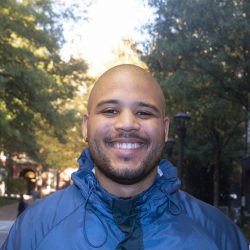 |
| Jean Luis Suazo Betancourt MSAE '19 |
After you graduate, what is your next adventure?
After I receive my master's, I will go back to studying for my quals in January. I'll hold off celebrating until I pass. After the quals, I will go back to work in Dr. [Mitchell] Walker's lab, where I will be working toward a doctorate.
What about your next adventure are you most looking forward to?
It'll be good to get the chance to do more research on electric propulsion. I'll be using laser diagnostics to study Hall Thruster plasma and I'll be working with [fellow grad student] David Jovel -- someone who definitely pushes and challenges me in ways that maximize my learning. I look forward to working with him. The most exciting part is finding some interesting problems that can be tackled with the capabilities we have developed in the [High Power Electric Propulsion] lab. I'll be using what I've already learned to come up with really interesting questions to answer in my doctoral research.
Did you have any previous co-op, internship, or research experience in this area?
I received a GEM [Graduate Degrees for Minority Engineers] scholarship that has paired me with the Aerospace Corporation, where I worked in the performance modeling group my first summer in graduate school. I'm still working for them eight hours a week, remotely. My research has been with Dr. Walker and Dr. [Adam] Steinberg, focusing on the initial development of the Thomson Scattering Diagnostic System.
How did your educational experience at Georgia Tech help you to achieve your goals?
Georgia Tech is a very challenging place, both academically and intellectually. Academically, courses I've taken here have been some of the most impactful courses I've ever taken. They've been well-developed and crafted to get the most out of me. Intellectually, people here do not stop until they've developed some depth of understanding. It's expected that you really think about what you're learning. And it's humbling to be around really smart people who are still willing to get something wrong so that they can better understand how to get it right. At Tech, it's not enough getting the right answer; you want to be able to explain why it's right. That's why a lot of us came to Tech, to become good thinkers, to be curious about how and why something is right.
What advice would you give to an underclassman who would like to follow the same path?
The Ph.D. journey is very personal. It goes by very fast, especially the first year, but it can really slap you around the place, so you need to steady yourself. You need to not be afraid of the changes it's going to make in you, because no one here is going to get away without having to acclimate to something. Maybe you always had the highest grades as an undergraduate or you were the smartest person in the class. That won't be the case here. It's crazy because, no matter how good you are -- and we are all good, because we got into Tech-- the expectations are higher. Think more about asking the best question rather than having the right answer. And follow the advice of your advisor. He or she won't be putting challenges or tasks in front of you that you can't do. Their job is to help you succeed, professionally, academically, and intellectually.
How did your educational experience at Georgia Tech help you to achieve your goals?
When I started my PhD. studies here, I was not certain of my goals, so my experience here helped me to shape those goals. As an engineer, it's not good enough to go in with the intention of contributing to technology; you have to know what you want to contribute and work hard at it. The atmosphere at AE helped me to shape exactly what I want to do - large-scale stochastic control - because I talked to different professors, different students, different researchers. I went to ME, to Math, to ECE. That's how I learned about what Dr. Theodorou was doing. And that changed everything.
What advice would you give to an underclassman who would like to follow the same path?
Work with industry while researching, because academia has its own agenda - to push science- whereas industry has to rely on proven techniques. To give yourself the best exposure, try to do problems with whomever you can, on as many different topics as you are interested in. I had a great exposure at Tech. And I'd say that's what you should expect from a doctoral program, to give you more exposure. In the end, you will build depth as you find your niche.
Josh Ingersoll, MSAE '19
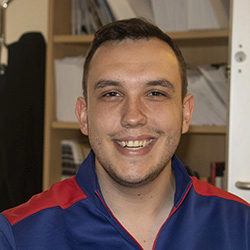 |
| Josh Ingersoll, MSAE '19 |
What is your next adventure?
I have accepted a position as space systems engineer at the Aerospace Corporation in Chantilly, Virginia. I will be working in the vehicle development and innovation department doing back-of-the-envelope designs for Department of Defense five-star generals who want us to develop systems for national defense.
What about your next adventure are you most looking forward to?
To be honest, having a 9-to-5 job will be great. As an undergraduate at Tech, school was life, and life was school. As a grad student with a fiancee, I put up a little more of a barrier on my time, but I still answered more emails after midnight than I want to admit.
Did you have any previous co-op, internship, or research experience in this area?
My graduate research has been in optical communications for mega-satellites. That involves using laser to pass information between satellites. You can’t jam a laser, but the thing is, you have to line them up.
As an undergraduate, I did research with Dr. Lightsey setting up the ground station for our CubeSat projects. To learn how to use a ground station, I actually went to the Van Leer Building and pointed Georgia Tech’s satellite dish to the NOAA satellite to get live imagery of North America.
As an intern, I worked with GE Aviation in Cincinnati, working on the GE 9X the summer after my third year as an undergrad. The next summer, I was at NASA Ames, in Silicon Valley, working on their Small Spacecraft Technology State-of-the-Art Report. That’s a document that NASA publishes cataloguing new hardware. It’s used as a reference by the AE Senior Design class, so it was kind of cool that, when I was TA’ing that class, I was able to point them to something that actually had my name on it. The next summer – summer of 2019 – I worked as an Isakowitz Fellow at OneWeb in Cape Canaveral in their business development and third-party sales supporting a DARPA contract.
It was through the Isakowitz Fellowship that I got the job at the Aerospace Corporation, actually. As a part of the Fellowship, we had a reception where we met Elon Musk and Buzz Aldrin, but I also got a chance to meet the head of the Aerospace Corporation, who is also the head of the Isakowitz Fellowship. I went right up to him, with my resume, and told him that I’d heard a lot about the Aerospace Corporation and wanted to work with his company. He gave me the opportunity to interview with his team, and, as a result, I was able to not only work with them, but to choose where I would work.
How did your educational experience at Georgia Tech help you to achieve your goals?
What I’ve said to the students I mentor, and to anyone who asks, is that Tech has continually opened up greater and greater opportunities for me – a snowball effect, really. The single best example came right after I finished my last class as an undergraduate. I was having a beer and planning to bartend for the summer before starting graduate school, when I got an email from Dr. Lightsey. He said he’d just gotten an email from a colleague at NASA Ames, telling him that a summer internship had opened up, and asking him if he knew any qualified students. He asked me if I minded if he sent my name to NASA. I said ‘yes,’ and, 45 minutes later, I had a call from NASA, asking to set up a phone interview the next day. So the next day, I woke up, interviewed with NASA, and at the end of the call, they asked ‘Can you start in two weeks?’
That’s an example of what Tech does. It puts you in the right place at the right time to take advantage of opportunities. And it prepares you well for those opportunities. That internship gave me great experience and great references, which I used to get the Isakowitz Fellowship the next summer. And the Isakowitz Fellowship led to my job at the Aerospace Corporation.
What advice would you give to an underclassman who would like to follow the same path?
First of all know this: no matter who teaches AE 2010, it’s going to kick your butt. That’s true no matter who you are. Thermo Fluid Fundamentals is just hard.
The other thing is, and it sounds cheesy, but it’s true: don’t be afraid to introduce yourself to your professors. If you are doing well, they want to know you. If you are having a hard time, they need to know you – and they can help. I’ve seen this as a graduate student teaching assistant, too: the more I know a student, the better I can help him. Put your professors’ office hours into your schedule. The worst-case scenario is: you will be doing your homework in their office where they can help you. The best-case scenario is that you will establish a relationship with them, and that’s always going to help.
Robert Casey Wilson, MSAE '19
What is your next adventure?
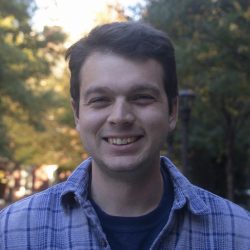 |
| Robert Casey Wilson, MSAE '19 |
I have accepted a job as a propulsion analyst at SpaceX in Los Angeles. I'll be doing structural analysis for SpaceX liquid rocket engines.
What about your next adventure are you most looking forward to?
I'm excited to be moving to the west coast, because I grew up on the east coast. I'm also excited about the job, which is more or less a continuation of what I was doing as an intern. I'm looking forward to seeing the Starship fly sometime in the next few years because I'll be doing work to support it.
Did you have any previous co-op, internship, or research experience in this area?
Research-wise, I've worked on airbreathing propulsion systems with [Dr.] Jimmy Tai. Before I got to Tech as a graduate student, I did two internships at JPL, where I worked on optics for telescopes that are designed to find exoplanets. The optics are tricky because these exoplanets are about 10 billion times fainter than the stars nearby. Towards the end of my undergrad, I was pretty sure I was going to come to Tech, but I interviewed with SpaceX while I was at JPL, and I got an offer. That's when something didn't feel right. So I flipped a coin, and it came up for SpaceX. That was the company I'd always wanted to work for and I realized that, if I gave it up to go to graduate school, I may never get that offer again. Still wasn't sure. So I made a spreadsheet with 15 different metrics to see where I should go. Even then, the results were all within a margin of error. If was 50/50 either way. I had no idea if I made the right decision. And maybe I still don't, but my gut tells me that grad school at Tech was the right decision. I did an internship at SpaceX last summer, and that really helped me to get a job there.
How did your educational experience at Georgia Tech help you to achieve your goals?
For one thing, being involved in the ASDL [Aerospace Systems Design Lab] gave me an opportunity to learn systems engineering. It also helped me take things I learned as an undergraduate and apply them to real-world problems. That's exactly what the Grand Challenges do - give you a problem to solve for a company. I was involved in two. In the first, I helped design an ICBM - the successor to the Minuteman - for a AIAA Missile Systems competition. In the second one, I worked with NASA's Advance Concept Office in Huntsville developing a framework for repurposing codes.
I also got a great deal of stress relief from working on Sustain Alive [Tech's submission to the Spaceport America Cup competition]. Whenever I was burned out with the lab, I would go over and work on the rocket. I did as much learning as I did teaching, but, in the end, it was an outlet because I got to work with a great team -- mostly freshmen -- who were willing to use all of their free time to the rocket. The dynamic was great, and winning the competition as a first-year team wasn't bad either.
What advice would you give to an underclassman who would like to follow the same path?
For one thing: don't take things too seriously. Find a place to go when you are stressed and go there. For me it was the rocket team. Also, find people who have common interests and you'll find people who will help you de-stress. That happens a lot with the student club teams, like the rocket team I worked with. YOu can't overestimate the impact. NO matter how busy you are at crunch time, you'll see people putting in time on the club project. With the [Sustain Alive], people put in as much time working on that rocket as they did studying. And it helped. That's one of things that convinced me that I'd made the right choice when I came to Tech - these are the people I want to look back and remember. That team mentored me.
Zivan Bholai, BSAE '19
What is your next adventure?
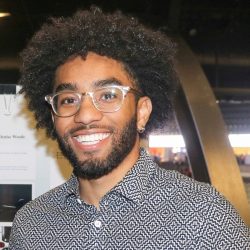 |
| Zivan Bholai, BS AE '19 |
I accepted a full-time offer from Microsoft in Seattle to join their project management devices team. It's a continuation of what I did as an intern, where they produced the hardware and I worked on the cosmetics -- flush, finishing, dimensioning. I was somewhere between mechanical engineering and industrial engineering and it was a great fit. At first, I was a little confused, so I asked my supervisor 'What do we do?' and he laughed and said 'That's the question you have to answer.'
I will manage certain features and functionalities on the device to improve user experience.
What about your next adventure are you most looking forward to?
I came to Tech to study aerospace engineering so I could become an astronaut. And I do want to go to space. But I now realize that within 30 years, space tourism will be a viable way of going to space, and I can prepare to be a part of that industry. I don't have to go the astronaut route. I'm not there yet, but Microsoft will be a great place to start. At Microsoft, I can build a professional network that goes around the world. It's a powerful place to start my career. It's a hub for engineering, new ideas, and new technology.
Did you have any previous co-op, internship, or research experience in this area?
I did four internship rotations as an undergraduate. Sophomre year, I went to GE [General Electric] in Cincinnati to work as a systems tests engineer on the the GE 9X engine. I was testing to learn more about icing and engine performance. We had to throw a frozen turkey through the engine to make sure it could be spit out. My second rotation was also at GE, but I went to Lynn, Massachusetts where I was a manufacturing quality engineer. My next internship was at the EM Corporation in Peachtree City where I was a design engineer, working with my mentor to develop a new modern lighting concept. It's not what I would have expected, but it gave me design experience for the full range of a project, and I got great references. My last internship was at Microsoft, in their new product implementation [division]. That's where I made the connections that led to my job.
How did your educational experience at Georgia Tech help you to achieve your goals?
I always wanted to go to Tech, only Tech, but I didn't know how much it would help me until I got here. One of the things that really expanded me was studying abroad. My first experiences was when I was in China for three weeks, working as an operations engineer, doing trade studies to see why a track pad was warped. It was exciting. I also did a semester at GT Lorraine, where I visited 16 or 17 cities over the course of the semester. When I started, I only knew two other Georgia Tech students - from AE -, so this forced me to branch out and meet people from other schools. And that exposed me to new ways of looking at my engineering problems. It also got me to consider how other countries view the United States and forced me to think about how I see the world. The great thing is, with my new job, I have to look at the big picture, to see lots of angles. Going abroad introduced me to a bigger picture.
What advice would you give to an underclassman who would like to follow the same path?
First, be bold. Figure out what you want to try, and go for it. Then learn from it. You don't want to spread yourself too thin, but you also don't want to undersell yourself. Your friends can help you keep it in perspective.
And that's another key thing: get a friend group that's in your major and one that's outside of it. I have an aerospace mindset but my closest friends at Tech are ones I met abroad from other schools.
I also learned that an aerospace engineering degree doesn't mean you have to be an aerospace engineer. Learning to solve aerospace engineering problems has made me a better engineer, and I like planes and rockets, but I don't have to stay there. At the heart of it, I'm an engineer. I don't have to limit myself to one application of those skills.
Lastly, have fun. These last two semesters have made me realize that college is the honeymoon in your life. After this, comes work. I may not see a lot of my classmates again after we scatter to our new jobs or grad school, so the last few months, I've been making sure I spend time with my friends, not my video games.
Jared Delrose, BSAE '19
What is your next adventure?
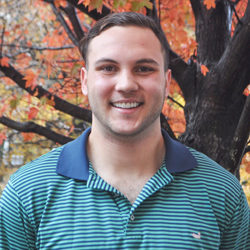 |
| Jared Delrose, BSAE '19 |
Up until a few days ago, I thought my next adventure would be going right into graduate school at Tech. But this really great opportunity came my way, so in January I’ll be starting a new job at Northrop Grumman in Long Island, and pursuing my master’s in aerospace engineering through the AE Distance Learning Program.
At Northrop Grumman I’ll be working in one of their test facilities as a rocket test engineer, conducting experiments, very similar to the research I’ve done at Tech, but on a much larger scale and in a larger facility.
What about your next adventure are you most looking forward to?
I’m really excited about test engineering and research engineering, it’s always been something I wanted to do since I got to Tech. I’ve tried to stay in a hands-on environment and that’s exactly what I’ll get to do. I’m excited about the challenges that will come my way and the new projects that I’ll get my hands on.
I’m also looking forward to continuing to learn more about combustion and propulsion. Being at Tech, even as an undergrad, I was able to take graduate-level courses as electives and that’s only continued to spark my interest in combustion and propulsion and learn everything I could while I was here.
I’m of course looking forward to not being a broke college kid anymore.
Did you have any previous co-op, internship, or research experience in this area?
I didn’t have much of an engineering background coming into Tech, but I was well-versed mechanically and knew I wanted to student combustion and propulsion. During my first-year at Tech, I was lucky enough to take AE 1601 with Dr. Brandon Sforzo, who worked on engines and worked in the [Ben T. Zinn] Combustion Lab.
He helped me get an undergraduate research position in the Combustion Lab where I worked with Prof. Jerry Seitzman on ignition performance and diagnostics. That job turned into a place where I learned thermos-dynamics and heat transfers on the job. I also researched with different groups and professors on campus, including Prof. Mitchell Walker and Prof. Wenting Sun. Working with Prof. Walker’s group got me interested in electric propulsion, which is the area I hope to gain more of a mastery in during grad school.
I knew it was important to have a well-rounded resume, so I applied for a co-op position with Delta TechOps. January 2018 started my three rotations with them in their propulsion engineering department.
It was really interesting working with a different team of engineers and on larger-scale rigs. I was able to build and hone-in on a lot more of my skills and see what issues and tasks the industry deals with. I liked the fast paced environment and Delta gave me a lot of freedom too. They have a lot of people from Tech there so it was really easy to fit in and transition into their work environment.
My favorite part was having that responsibility to work on real-life situations and being able to act as an engineer in writing up substantiations on the work and help lead investigations.
How did your educational experience at Georgia Tech help you to achieve your goals?
The job that I just accepted is right in the area and concentration that I had hoped – test engineering. I couldn’t have gotten it without the preparation from my classes, research, and drive to apply what I know.
It felt as though I was a graduate student in my time as an undergrad because of how much freedom and responsibility I was given as an undergrad, and I’ve found through talking with my friends that that’s not the norm at other colleges.
During my interview with Northrop Grumman, they even chuckled because I had exactly what they were looking for as far as test engineering and had such a diverse background. They said that’s not something they typically see when interviewing graduates straight out of college.
What advice would you give to an underclassman who would like to follow the same path?
The one thing that gets you through aerospace engineering is having a passion for aerospace engineering. The course work gets so tough and it’s a lot of work and sometimes that’s hard to see when you’re in the middle of it. But now I’m seeing myself and my friends graduate and get jobs that we’re passionate about and dreamt of having.
Whether that means you’re coming in as a freshman and you have no idea what you want to study, but you’ve heard aerospace engineering is cool, I recommend you try as much research as you can, talk to different professors, try and narrow down your field as to what you find interesting and really keep that in the back of your mind the entire you’re here. X is your goal, you’re working towards it, and keep that interest alive.
Classes will get really difficult and some classes you may not find interesting, but if focus on your ultimate goals and seeing obstacles as opportunities, it will better prepare you for when you finish that difficult class or assignment.
For example, I wasn’t a big fan of structures but I knew that there were going to be skills and things I needed to learn in that class. I knew I wouldn’t be necessarily using those equations every day of my life, but those equations and course work were going to be worth knowing and would help me get closer to my goals.
If you are coming in and don’t know what you want to do in aerospace, the good thing is that there’s a lot of different research, co-ops, internship opportunities - all to help round you out really nicely.
Ai Thai, BSAE '19
What is your next adventure?
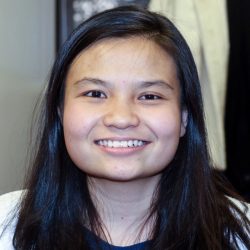 |
| Ai Thai, BSAE '19 |
I will be returning to Delta, where I have been interning, to work as a project and reliability engineer in their new predictive maintenance initiative within Delta. I will also be starting a graduate program in data analytics in ISyE so I can learn to do my job even better.
What about your next adventure are you most looking forward to?
I'm excited because I will be working with a fleet of 500 aircraft and different people from different airlines. Each person has a different work dynamic -- something I can learn from. And it will be a challenge to communicate because I will be working with people who don't get paid by me [Delta] but they will have to listen to me. I am looking forward to making that work. Also, it will be exciting to make an impact. Delta is in the forefront of using data analytics, and I'll be working with a great team. But I know that big data does not automatically mean great analytics. That will be my job, to make those analytics meaningful.
Did you have any previous co-op, internship, or research experience in this area?
I wanted to be ready to take on an internship like the one I got at Delta, but I did not have work experience. So I started, sophomore year, by contacting someone I knew at Vietnam Airlines to see if I could learn what they do. When I got there, I moved to a city I did not know, a city that scared me, really. They did not have a formal internship program, so I had to make my own learning environment. I introduced myself to everyone I could so that I could learn what they do. It was very bureaucratic, but I was persistent. I learned to be very persistent and to have confidence in myself. I began to see that i love learning and that I can adapt quickly to different environments, so it made sense that I should be more confident. Eventually, I spoke to the head of the maintenance control center, who helped me to get rotations in eight different departments over the three months I was there. The experience really helped me when I went on to interview for an internship at Delta. I asked good questions and had some answers for the questions they asked .
In the Fall of 2017, I co-opped at Delta as a repair process engineer and in the summer I got another co-op as a repair development engineer doing cyclic oxidation testing of low-pressure turbine blade coatings. In the Spring of 2019, I co-opped as aa project engineer, managing a repair project for the CFM-56 engine. That led to another summer co-op as a reliability engineer in the summer of 2019.
How did your educational experience at Georgia Tech help you to achieve your goals?
I got involved with other things on the side, while I was taking classes. When I got interested in personal aerial vehicles, I got involved with the team that was designing a vehicle for the GoFly Competition. I built a dynamics model that predicted the power required for the vehicle they were designing for the competition. In the evenings and on weekends, when I was co-opping at Delta, I helped build a small scale wind tunnel to test the aerodynamic co-efficient of a ducted fan system. We started out that project not having any place to work, but we did it because we persisted. We ended up using a friend's garage. The experience was good because it taught me to think outside the box, to take initiative, to make things happen any way you can.
What advice would you give to an underclassman who would like to follow the same path?
If you have been admitted to Georgia Tech, Georgia Tech has resources that can make you successful. You have to reach out, ask people who can teach you things. And then you must work hard.
All of the challenges I had at Georgia Tech were there to make me stronger, to handle bigger challenges in the future. You have to believe that you will learn from the things you don't know. I used to not communicate well - not because of my accent, but because I lacked confidence. At Tech - in my co-ops and in my interactions with professors - I saw that a lack of confidence would make people not give my opinions the respect they deserve. That motivated me to work harder on my communication. I am glad that it motivated me.
If you are a first-generation college student, like I am, there are some questions, some things, that might be new to you. For instance, I did not really understand what they were talking about when they said I should network with people to find out whether I would like a job. Why would I need to know whether I liked it? It's a job. That's not something I had questions about.
But I took that suggestion, and I feel that I learned so much from talking with mentors. I began to realize how important it is to fit into a job, to feel like you are a part of the team. It has made me very excited about joining Delta as an employee when I graduate.
Trenton Charlson, BSAE '19
What is your next adventure?
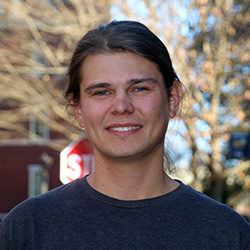 |
| Trenton Charlson, BSAE '19 |
I've accepted a job as a turbo machinery engineer at SpaceX. I'll be working on the Raptor engine.
What about your next adventure are you most looking forward to?
I'm looking forward to working full-time on rockets, as opposed to it being a hobby. At Tech, I was very involved with the Yellow Jacket Space Program - putting in 40 to 60 hours a week on the rocket engine we built. That was entirely outside of any classes. That's what I want to be doing full-time.
Did you have any previous co-op, internship, or research experience in this area?
I tried working as a research assistant at GTRI, but ultimately, I found that it spread me too thin. I didn't have enough time to work on things that I really wanted to do. A friend of mine who worked at SpaceX reached out to me and asked me to send him my resume because he thought they [SpaceX] would like what I had to offer. Well, I got the job before I interviewed for it. I started out as a propulsion component engineering intern, working on valves for the Falcon 9 Rocket. My job was not to design them, but to make sure they qualified for re-use. This put me in the role of being a 'responsible engineer' -- someone who knows every last detail about a particular component. My second internship was in turbo machinery for the Raptor, and that worked out well. I'm heading back there after I graduate.
How did your educational experience at Georgia Tech help you to achieve your goals?
At Tech, I found a concentration of other young adults who shared my passion for building really amazing things. It was great. In high school, I had built robots competitively and I had cooked rocket propellant in my garage - not well, but I did it. But I was tinkering for the sake of tinkering because that's all I could do. At Tech, there are things like the Yellow Jacket Space Program, where we just hot-fire tested a liquid rocket engine. Freshman year, I joined the Robo Jackets Battle Bots team and met my best friend, from ME, who had the same inclinations to do crazy but science-y things.
He had done something with Tech's Mini 500, so he had an old tricycle. Me, I had stopped by an outlet store to pick up some socks one day, and I walked out with a chainsaw -- not because I wanted a chainsaw, but because it had a really cheap engine. We decided to attach the chainsaw engine to the tricycle and, well, it worked. After that we decided we'd try to motorize one of those electric cars that toddlers drive. I had another leftover motor and we found one of those little pink Barbie Jeeps on Craigslist, and that worked, too. It went viral, actually.
What advice would you give to an underclassman who would like to follow the same path?
It's cliche advice, but it's true: do what makes you happy. If you need to know something and you have the intelligence to learn it, go for it. And then keep going. That's what I did.
I took an unconventional track for a Tech student: I didn't do research. Compared to building rockets, rocket engines, and Battle Bots, research was a waste of my energy. I like doing hands-on projects. I decided after awhile that I wasn't going to be happy doing straight research. It wasn't going to lead me to the career I wanted. The role I am going to take at SpaceX when I leave is in development, where I will find problems and design solutions. That's what I learned to do with the [Yellow Jacket Space Program] rocket engine that we just tested: I started with an idea, created a design, built it, and tested it.
That corresponds to what makes me happy.